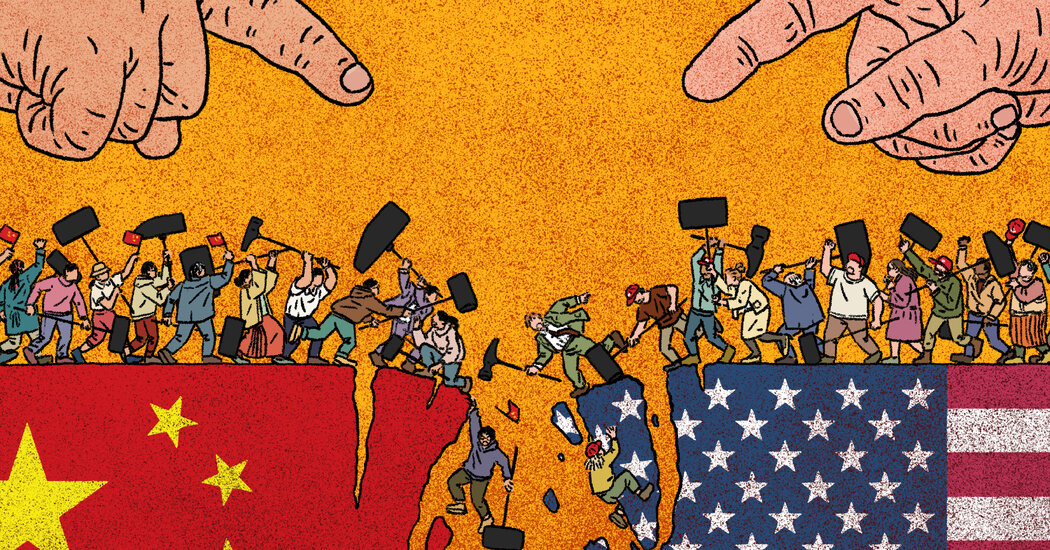Even earlier than this yr’s financial turmoil hit, monetary nervousness amongst American citizens was once operating prime. In reality prime.
4 out of 5 American citizens in a survey for Uncover remaining yr mentioned they have been apprehensive about their cash state of affairs, with inflation, on a regular basis bills and the state of the financial system main a litany of considerations. Just about two-thirds mentioned they might be financially unprepared in the event that they misplaced their process, and greater than part felt the similar approach a couple of recession.
Now, price lists and an international business struggle, which might lift costs and discourage shopper and company spending, have economists elevating their odds of this kind of downturn this yr. Coupled with wild swings within the inventory marketplace, which is down about 9 p.c for the yr, it’s no surprise that monetary nervousness is spiking to new heights.
“Since Covid, we’ve all simply been looking forward to the following shoe to drop, moneywise,” mentioned Megan McCoy, a monetary therapist and an affiliate professor of private monetary making plans at Kansas State College. “For years now, it’s been one more or less painful monetary state of affairs after any other. We will’t catch our breath.”
The risk is not only the monetary nervousness, which has been linked to better chance of more than a few well being issues, from despair to middle assaults. It’s additionally that the drive can pressure you to take movements that would in the end make your monetary state of affairs worse.
“The urge other folks really feel to do one thing to make themselves really feel higher may also be overwhelming,” mentioned Anne Lester, former head of retirement answers for J.P. Morgan Asset Control and creator of the e book “Your Easiest Monetary Lifestyles.” “Nevertheless it’s demanding to make sound choices while you’re scared.”
Listed here are six methods that mavens say will let you stay a fab head and offer protection to your cash when nervousness is heating up.
Alter your standpoint.
It’s demanding now not to concentrate on the newest hairpin turns of the inventory marketplace. Within the span of simply 5 buying and selling days this month, the S&P 500 had one of the most worst two-day drops on file (10.5 p.c) adopted by means of its perfect one-day climb since 2008 (9.5 p.c). Upload it up, although, and the index is down 4.4 p.c for the month — and April isn’t even part over but.
However what occurs to inventory costs in one week, month and even yr gained’t subject ultimately to retirement savers, a lot of whom have a long time to head earlier than they forestall running, mentioned Brad Klontz, a monetary psychologist and creator of the e book “Get started Pondering Wealthy.” Even retirees steadily have an funding period of time that would span 20 or 30 years or extra.
From that standpoint, shares nonetheless seem like a wise funding for long-term expansion, specifically when paired with fixed-income property for balance. During the last 100 years or so, shares have returned 10 p.c yearly on moderate, Dr. Klontz mentioned, handily beating different property.
And whilst recessions are painful, he mentioned, they’re a regimen a part of an financial cycle, taking place each few years or so, and the rustic has at all times bounced again from them, too.
“What feels within the quick time period such as you’re headed off a cliff is extra like a velocity bump while you have a look at it with a long-term standpoint,” Dr. Klontz mentioned.
Viewing your 401(ok) efficiency with a special lens is useful, too, Ms. Lester mentioned.
“We have a tendency to anchor on no matter our very best stability was once, so you can be specializing in how much cash you’ve misplaced since then,” she mentioned. “However for those who have a look at your stability from a yr in the past, you’re most certainly nonetheless up. And in comparison to 5 or 10 years in the past, you’re most likely up much more considerably.”
Gradual your roll.
For some 401(ok) buyers, the urge to promote shares as costs tumbled has proved too robust to withstand.
With those savers transferring cash from shares to fixed-income finances, the volume of 401(k) trading all the way through the primary quarter of 2025 was once the very best in just about 5 years, consistent with Alight Answers, which tracks place of business retirement plan task. (The task concerned not up to 1 p.c of general 401(ok) plan balances, however the leap is notable.) The sell-off picked up further steam after the free-fall available in the market on April 3 and four, with 10 times the standard quantity on Monday, April 7, the following buying and selling day — probably the most transactions in one day since March 2020.
This presentations how simple it’s for nervousness to spur motion that might not be to your perfect hobby, since the ones dealers neglected out at the surge in inventory costs later within the week, which allowed the foremost indexes to get well a large chew of the losses incurred thus far this yr.
“All choices are bets — we by no means know in the event that they’re sensible or now not till time has handed,” mentioned Naomi Win, a scientific psychologist and behavioral analyst with Orion Guide Answers, a wealth control tech company. “Face up to the tradition of immediacy by means of finding out to pause and be considerate and take time on choices reasonably than reacting on emotion.”
A method to do that: Impose a rule for your self that you just should wait a minimum of an hour earlier than creating a business; set a timer to carry your self to it. And hunt down recommendation first from a relied on supply — a monetary adviser, when you’ve got one, or a a professional pal or colleague with a peaceful head and revel in in up and down markets.
This buys time to opposite the physiological reaction to acute monetary nervousness. When rigidity rises, Dr. Klontz mentioned, the frame’s fight-or-flight reaction kicks in, enlarging the a part of the mind that processes feelings like worry and nervousness (the amygdala) and closing down the section that is helping us evaluation choices and make knowledgeable possible choices (the prefrontal cortex).
“It takes a excellent half-hour to an hour to loosen up,” Dr. Klontz mentioned. “Then the prefrontal cortex turns again on, and persons are left feeling, ‘Why, why did I do this?’”
Don’t have a look at your balances. (In reality, don’t.)
The ache of dropping cash is extra robust than the excitement of constructing it — a cognitive bias that behavioral finance mavens name loss aversion. That’s why continuously checking your 401(ok) when the marketplace is falling is a foul thought; seeing your decrease balances simplest makes you’re feeling worse.
It might probably additionally build up the possibility that you just’ll lose more cash. Consistent with studies from the behavioral economists Shlomo Benartzi and Richard Thaler, buyers with long-term objectives who infrequently test their accounts finally end up incomes considerably upper returns on moderate than those that track extra steadily. Savers who test extra continuously will extra steadily see losses, which scares them off making an investment in shares, although shares, through the years, earn considerably greater than bonds and money.
Should you test your account day by day, for example, you’re prone to see losses 30 to 40 p.c of the time, ancient knowledge presentations. Should you test yearly, you may apply a loss simplest as soon as each 3 or 4 years or so. That’s why advisers counsel checking your balances not more than as soon as 1 / 4 and most likely simplest yearly.
Attempt to prohibit your consumption of unhealthy information in regards to the financial system and marketplace, too. “We’re herd animals, stressed out to pay shut consideration to the temper of other folks round us,” Dr. Klontz mentioned. “Should you’re continuously uncovered to the panic of others, you’re going to be very prone to doing what everybody else is doing and making unhealthy choices in consequence.”
Consider the worst.
It should sound counterintuitive, however figuring out your greatest worry about your monetary state of affairs now, then desirous about the way you’d set up the fallout, is usually a calming workout.
“Psychologically, merely realizing there are choices reduces nervousness in an differently paralyzing state of affairs,” Dr. Win mentioned.
Say, as an example, you’re apprehensive about dropping your process. The very first thing you may do is calculate how lengthy your emergency fund will remaining, then achieve out to skilled connections who may lend a hand with a task seek. In case your process hunt lasts a very long time and also you burn via your financial savings, what would you do subsequent? Perhaps it’s essential to transfer to a less expensive condominium, downsize and even transfer in with circle of relatives for some time.
“The worst time to make disaster plans is while you’re in the midst of a disaster, since you’re now not considering as obviously — it’s the rationale we do fireplace drills,” Ms. Lester mentioned. “With a bit of luck, you’ll by no means have to tug the cause on those plans, nevertheless it’s useful to have them, to grasp what you’d do.”
Establish one transfer.
You can not regulate inventory costs or whether or not the financial system will tip right into a recession. So center of attention on what you can regulate, particularly movements that would reinforce your monetary state of affairs in a downturn.
Take spending. “Should you don’t have sufficient money put aside to hide your bills for 3 to 6 months should you’re laid off, you must be taking a look aggressively to scale back discretionary spending and get that emergency financial savings constructed,” Ms. Lester mentioned. “You might really feel like each nickel is already allotted, however for anyone who’s getting takeout, touring or who has greater than 0 subscription products and services, you’ll be able to to find puts to scale back.”
Should you’re apprehensive you may lose your process in a recession, attempt to make your self extra indispensable by means of finding out a brand new ability this is in prime call for to your box. Or heat up your skilled community by means of connecting with other folks to your trade or broaden an aspect hustle for additonal revenue, Dr. Klontz steered.
Discovering different puts to your existence to say regulate that experience not anything to do with cash can lend a hand calm monetary nervousness, too — and supply a welcome distraction. Ms. Lester, as an example, lately discovered respite from the marketplace chaos by means of tidying her house place of business. Tending your lawn, organizing circle of relatives footage or taking a day by day stroll are actions that can provide you with a way of mastery over your atmosphere when your funds really feel out of doors of your regulate.
“Once you get started growing extra order, even a bit of little bit of regulate someplace, you’re feeling such a lot higher,” Ms. Lester mentioned.
Follow self-compassion.
Every so often compounding the monetary nervousness is a way that you can be partially guilty on your cash struggles.
“From time to time like those, other folks steadily see monetary disasters as private disasters: The marketplace is crashing, and now I’m now not going to manage to pay for as a result of I didn’t make sufficient or save sufficient or I didn’t paintings demanding sufficient or I’m now not excellent sufficient at managing these things,” Dr. McCoy of Kansas State mentioned.
She encourages a steady reframing: “Inform your self, ‘I did the most productive with what I knew on the time.’”
Ms. Lester mentioned she additionally noticed this development of self-blame continuously. “Figuring out that we’re hard-wired to act positive tactics below positive instances, and forgiving your self, is in point of fact essential,” she mentioned. “Remember that there are lots of issues you’ll be able to do from this level ahead to lend a hand your self financially, take a deep breath, then take that subsequent step.”



